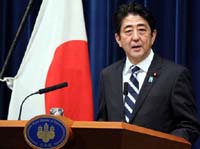Expectation for Prime Minister Abe to implement the best energy policy
From the electronic “Salaam Qurterly Bulletin” No.5, February 2013.
Ikuzo Kobayashi, President of the Salaam Association
Under the government of the Democratic Party of Japan, Japan’s “Basic Energy Plan” was stalled. DPJ government mistook people’s anxiety and nuclear power allergy caused by the Fukushima nuclear power plant accident for an overwhelming support for its energy policy advocating “zero nuclear power generation by 2030” without alternatives. Japanese people were not swayed by such emotional argument and demonstrated their will for a level-headed energy policy through the election.

On January 11, 2013, Prime Minister Abe held a press conference at the Prime Minister’s Office in response to the decision on the emergency economic measure. (From Prime Minister’s Office homepage)
Oil was discovered in the state of Pennsylvania in the United States in 1859, and the world entered the century of oil. It was British First Lord of the Admiralty Winston Churchill who attempted to switch the energy source from coal to oil. It was 1912 and the British Parliament decided on the switch in 1914, seven weeks before the start of the World War I. It was the decisive factor of the British victory over Germany in military power. In the history of wars, Russo-Japanese War became the last war that used coal as the energy source.
By 1940s, the powerful nations of the world had been fiercely competing to secure the oil resources for about 100 years. It is questionable how much Japan without oil resources recognized the seriousness of the competition for the oil. ABCD encirclement and oil embargo policy against Japan initiated by the U.S. President Roosevelt in 1941 played a major role in pushing Japan toward the Pacific War. Japan had no choice but to expand the war to the south in search for the oil in Indonesia.
In the post-war period, Japan designated oilfield development as one of the reconstruction policy based on bitter experience of war defeat. That policy evolved into the policy of stable oil supply after the first oil shock in 1973. The energy mix policy (diversification of types and areas of energy sources) was born based on the idea that security and stability of people’s life and Japanese economic base cannot be achieved without stable supply of energy. This policy functioned well and Japan overcame the second oil shock and achieved the status of the second strongest economic power in the world around 1985 with some scholars talking about “Japan as No.1.” (to be continued into the electronic “Salaam Quarterly Bulletin” No.5)
Full article available in the electronic “Salaam Quarterly Bulletin”, No.5, February 2013.
